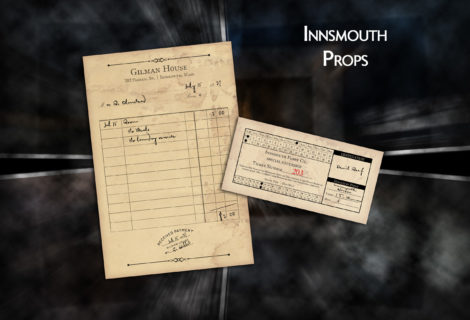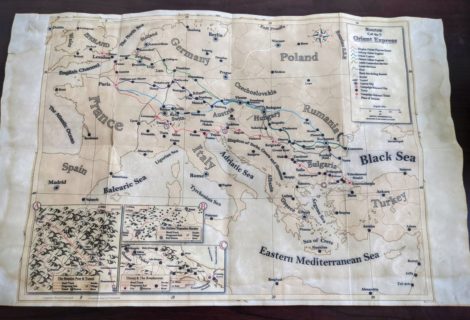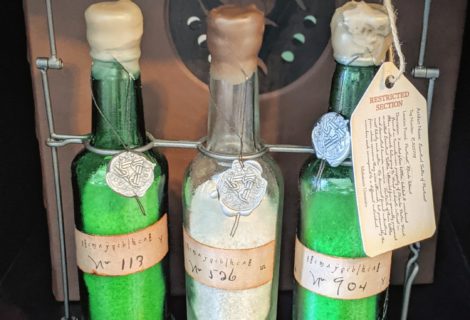Clues in Play – Part 1
 I’ve already written how part of what I’m working on with this game is integrating some board game elements into the actual gameplay. Probably the most obvious example of how the table will look different from many games is the inclusion of a lot of cards. Some of these cards are used for characters, locations, ancient tomes, or strange artifacts – but the majority of the cards in the game represent one of the most central gameplay elements of any investigative game: clues.
I’ve already written how part of what I’m working on with this game is integrating some board game elements into the actual gameplay. Probably the most obvious example of how the table will look different from many games is the inclusion of a lot of cards. Some of these cards are used for characters, locations, ancient tomes, or strange artifacts – but the majority of the cards in the game represent one of the most central gameplay elements of any investigative game: clues.
Clues – From the Players’ Perspective
As a player, the the primary goal in play is to discover clues. Eventually, these clues will point to the truth behind whatever mysterious events the investigators are looking into – and maybe even reveal a way for the investigators to make a difference in the world (temporary though such success might be). These clues are integral to investigative gameplay, but it’s not always as simple as just finding the clues.
Play enough mystery games, and you’ll probably see at least one of the following issues come up:
- Players forget about some of the clues they already found.
- Players find a clue, but don’t realize it’s a clue.
- Players become convinced that some mundane detail is actually a vital clue.
I think I’ve briefly touched on these elsewhere, and I’ll probably go into them more in depth in the future. But for now, if you recognize any of these, you realize how they can create problems and potentially stall a mystery game.
 The way I’m using cards with clues is fairly simple. Whenever an investigator discovers a clue during play, the Keeper gives them a card that shows a brief summary of that clue. Nothing complicated – just a short phrase that describes whatever the players know now that they didn’t before. The investigators find a bloody, mummified body in the basement, with bloody footprints leading away from it. The Keeper gives the players a couple of cards, one with the description of the body and one with a description of the footprints.
The way I’m using cards with clues is fairly simple. Whenever an investigator discovers a clue during play, the Keeper gives them a card that shows a brief summary of that clue. Nothing complicated – just a short phrase that describes whatever the players know now that they didn’t before. The investigators find a bloody, mummified body in the basement, with bloody footprints leading away from it. The Keeper gives the players a couple of cards, one with the description of the body and one with a description of the footprints.
This effectively helps mitigate all three of the issues above. The players have a stack of all the clues they’ve found that they can review whenever they want. The players a clear about what information is actually a clue – after all they got a card if it was a clue – and this covers two out of the three.
So from the players’ point of view, clues are pretty simple: When they find clues, they get cards to keep track of them.
(For those familiar with Fate, clues are also Aspects – they describe the world as it is – and they can be used to have a mechanical effect within the system.)
Clues – From the Keeper’s (GM’s) Perspective
As usual for investigative games, things can be a little more complicated from the Keeper’s side of the table. If players can have a hard time keeping track of the clues they’ve found, the Keeper has to keep track of all the clues in the game – which clues have been found, which clues haven’t, where the remaining clues are, and how they might be found. If you’ve been a Keeper in these kinds of games, you also know that some clues are more important than others, more critical to the investigation. And since things don’t always go the way you expect, you may even have to alter some clues on the fly. (Okay, let’s be honest, if you’re the GM, the players will make certain things never go the way you expect.)
So the Keeper needs some tools to help manage all these clues (while they’re also keeping track of everything else going on). Recognizing that different clues play different roles in the game, sorting clues into different types can really help. There are two basic types of clues: core and supporting.
Core clues are those that are critical to the scenario. They are the clues that are necessary to the players figuring out how to bring the scenario to a successful resolution. Discovering all of the core clues will still leave a lot of unanswered questions, so the players may not understand what’s really going on, but they will have the bare minimum information necessary to figure out what they have to do to stop the cult, seal the gateway, defeat the creature… whatever has to be done to resolve whatever mystery or end whatever threat is at the heart of the investigation. Core clues also include information necessary for you to find other clues – such as a new location or character which possesses other clues.
Supporting clues are the other clues in the scenario which provide background and explanation. They help answer a lot of the other questions players may have about what’s going on, but they’re not indispensable the way core clues are. If the players don’t find a single supporting clue, they should still be able to “win” as long as they find all the core clues. It’s important to understand that supporting clues still won’t answer everything – after all, a cosmic horror game should always leave a little mystery.
Understanding which clues are core clues and which are supporting helps the Keeper run the game and keep it running smoothly. When the investigators go to a new location, you’ll know which clues there you need to make sure they find and which ones they can miss without bringing the game to a halt. When I write up a scene for a scenario, I include a quick list of all the clues up front so the Keeper can quickly identify which clues are available in the scene.
Due to whatever events lead up to the scenario, many clues will naturally be found at specific locations. The body and blood trail are found at the crime scene. The clues pointing to how the ancient artifact was stolen are found in and around the auction house vault. However, some clues could plausibly be found at different locations, and the Keeper can make adjustments to those clues based on the needs of the game. These kinds of clues are referred to as floating clues. They are core or supporting clues just like any other, but their location can vary.
So how do these different kinds of clues help the Keeper?
 Finding Clues
Finding Clues
Look around the web, and you can find a number of different ways to make sure play doesn’t stall because players can’t find clues. Examples includes never requiring rolls to find clues, spending points to find clues, and tripling the number of clues to increase the odds at least some of them are found. All of these have their merits, but they also rest on the assumption that all clues must be handled the same way. But that’s not true.
The point of distinguishing between different types of clues is to let the Keeper know what options are available for finding those clues. Since core clues are critical, you don’t want players to miss them because of a bad roll of the dice. Supporting clues, on the other hand, aren’t necessary to keeping the game moving forward, so you’ve got a few more options with them.
Finding Core Clues
Part of your job as Keeper is to make sure that, by the time a scene has drawn to a close, the players have found all the core clues available in the scene. Some clues are more or less just given to the investigators – a helpful NPC is sharing information or an obvious clue is out in the open. As long as the investigators are in a position to receive the clue or take some basic action to obtain it – like looking at the journal on the desk – they are given the clue. But which investigator gets the clue can vary, and the Keeper can use this to spread attention around between the PCs.
If it makes sense in the situation for a particular investigator to receive an obvious clue – one player describes their PC as leafing through the journal – then give that player the clue. If multiple investigators could notice the clue, then consider their skills. Figure out which skill would be most relevant to finding the clue and describe the investigator with the higher rank in that skill as finding the clue.
Other clues might require some effort or otherwise seem like their discovery is not a foregone conclusion. These are the ones that scream out for some kind of roll, and that’s okay. The roll provides dramatic tension, and let’s face it, finding important clues should be a tense moment in an investigative horror game. On the other hand, we’ve already established that the Keeper needs to ensure the players get the core clue. So the roll isn’t to determine if the investigators find the clue – it’s if they find it without complication.
Finding Supporting Clues
Supporting clues are easy. You have all the same options on the table as with core clues, but the investigators can also just fail a roll – or fail to even look – and just not find the clue.






Recent Comments